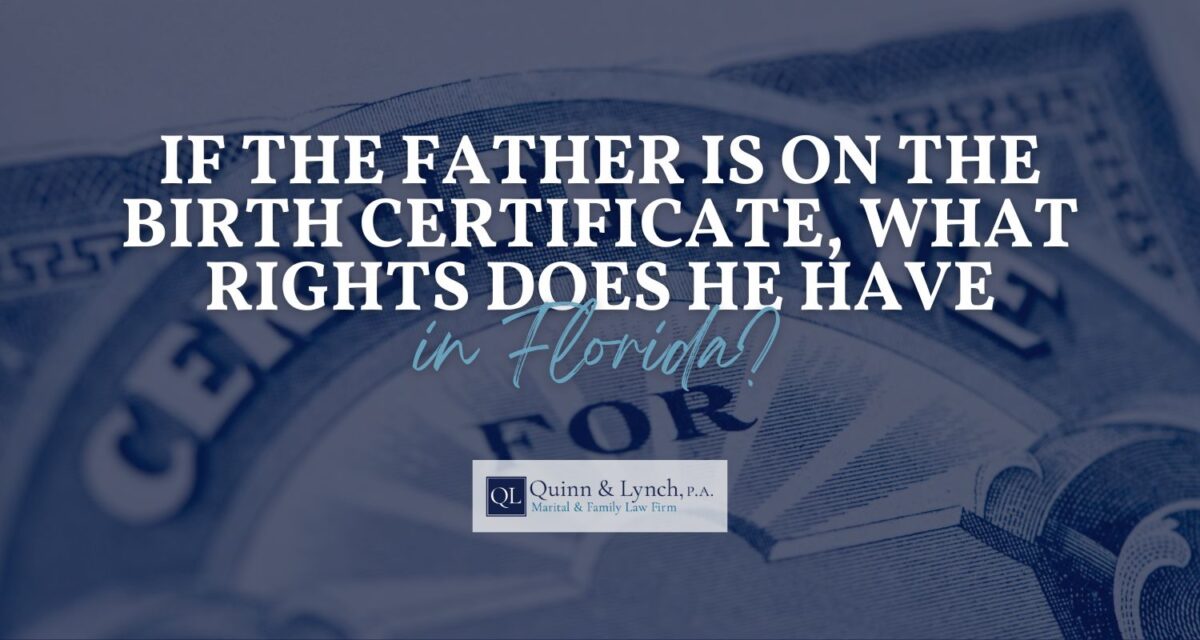If the father is on the birth certificate, what rights does he have in Florida? This is one of the most common questions unmarried fathers ask after their child is born.
The truth is, simply being named on the child’s birth certificate does not automatically give a father any legal parental rights. While it may show that he is the child’s biological father, it does not mean he has legal custody, shared parental responsibility, or visitation rights unless the court establishes legal paternity.
At Quinn & Lynch, P.A., our Tampa family law attorneys help unwed fathers establish paternity and build a meaningful role in their child’s life. If you have questions about your legal rights as a parent, call (813) 223-7739 or contact us online today.
Understanding Fathers’ Rights in Florida
Fathers’ rights in Florida have improved in recent years, especially with the passage of the Good Dad Act in 2023. In the past, there was no clear legal path for unmarried fathers to obtain equal parental rights, and the burden was often on the father to show Florida courts why he should have a role in the child’s life.
The Good Dad Act created a legal presumption that once the court establishes paternity, the child’s biological father should be treated as a natural guardian, giving him an equal voice in decisions about the child’s education, healthcare, and daily life.
The new Florida law helps responsible fathers stay involved in their children’s lives without unnecessary legal barriers. It also supports the idea that both parents, regardless of marital status, should have a role in raising their child, as long as it’s in the child’s best interests.
Legal Significance of Being on the Birth Certificate in Florida
Under Florida law, an unmarried biological father does not automatically gain parental rights just by being named on the child’s birth certificate. According to Florida Statute 744.301, when a child is born out of wedlock, the child’s mother is legally recognized as the natural guardian and has full legal custody.
Unless the biological father takes steps to become the legal father, he has no right to custody, visitation, or to make decisions about the child’s welfare. Even with his name on the birth certificate, the father must establish legal paternity before the court will consider granting him any parental rights.
Does the Birth Certificate Establish Legal Paternity or Custody Rights?

For unwed parents, having the father’s name on the child’s birth certificate does not mean he has any legal authority over the child’s upbringing, such as making decisions about healthcare, education, or where the child lives.
Florida’s paternity laws separate a biological father from a legal father. A biological father is the man who shares DNA with the child, but a legal father is the one who has been officially recognized under the law and granted parental rights and responsibilities.
To begin the legal process of establishing paternity, both the mother and father can sign a Voluntary Acknowledgment of Paternity form, usually at the hospital after the baby is born. This document allows the biological father’s name to be added to the birth certificate and legally recognizes him as the child’s father.
While the Voluntary Acknowledgment of Paternity makes the father a natural guardian, it does not automatically grant custody rights. The form establishes legal paternity, which allows the father to then petition the court for legal custody, visitation rights, and decision-making authority in the child’s life.
How to Establish Paternity in Florida
Knowing how to establish paternity in Florida is an essential step for unmarried fathers who want to gain legal parental rights. There are two main ways to establish paternity: either voluntarily or through a court order.
If both parents agree on who the child’s father is, they can sign a Voluntary Acknowledgment of Paternity form. Once filed, it becomes legally binding after 60 days, and the man is legally recognized as the father of the child. If there is disagreement about who the child’s father is, or if one parent wants the court to decide, a paternity action must be filed. This legal process may involve genetic testing to determine if the man is the child’s biological father.
After the father’s paternity is confirmed, the court can issue a parenting plan, set visitation rights, and assign child support obligations. Until the court establishes legal paternity, the biological father has no legal rights, even if his name appears on the birth certificate.
If you’re unsure how to determine paternity or need help with the legal proceedings, our Tampa paternity lawyers can guide you through every step.
Child Custody and Timesharing for Unmarried Fathers

According to Florida custody laws for unmarried parents, a father must establish paternity before requesting custody rights or inclusion in a parenting plan. Once the court confirms legal paternity, it recognizes the father as a natural guardian and evaluates timesharing and parental responsibility based on the child’s best interests.
Timesharing refers to the schedule that shows when the child will spend time with each parent, while parental responsibility determines who can make decisions about important matters, such as education and healthcare. This can be shared, where both parents work together, or sole, where only one parent has that authority. A court-approved parenting plan is still required and must be in place before any custody arrangement becomes legally binding.
Our Tampa child custody lawyers provide dedicated legal representation to help unmarried fathers enforce parental rights and establish a fair and practical parenting plan that supports ongoing involvement in the child’s life.
The Father’s Financial Obligations: Child Support
Once paternity is established, the father can be ordered to pay child support. Even without regular custody or visitation, a father may still be responsible for helping with the child’s financial needs.
State guidelines determine child support obligations based on each parent’s income, childcare and health costs, and the amount of time the child spends with each parent. Providing accurate information about income, expenses, and other financial details is crucial, as this determines the amount of financial support ordered.
Our Tampa child support attorneys work with fathers to ensure their rights are protected and that support amounts are calculated fairly under Florida law.
What Rights Does the Alleged Father Have Before Paternity Is Established?

Before the court establishes paternity, an alleged father (a man who believes he is the child’s biological father) has no legal rights under Florida law. This means he cannot request custody, visitation, or take part in making decisions about the child’s upbringing.
Until a court officially establishes legal paternity, the child’s mother is the only recognized natural guardian, and she has full parental responsibility. The alleged father must take the proper legal steps to be recognized as the legal father and gain the right to make decisions regarding the child’s life.
What Happens if the Mother Denies Visitation?
If there is no court-approved custody order or parenting plan in place, a mother can deny visitation, even if the father is involved in the child’s life. That’s why it’s so important to have a court order that clearly outlines the timesharing arrangement. Without it, the father has no legal way to enforce visitation rights.
Once the court approves a parenting plan, both parents are required to follow it. If the mother still refuses to follow the schedule and denies visitation, she could face legal consequences. The court may enforce the plan, order makeup time, or take other actions to protect the child’s relationship with both parents.
Many fathers ask, “If I have sole custody, do I have to allow visitation in Florida?” The answer depends on what the court order says. Unless the court restricts visitation for safety reasons, the other parent may still have visitation rights with the child. Our Tampa visitation lawyers assist fathers in establishing legal orders and protecting their right to spend time with their children. If your visitation rights are being denied, we can help you take legal steps to enforce visitation through the court.
Modifying or Enforcing Custody Rights and Support Orders
In Florida, either parent can request to modify custody or child support if there has been a significant change in circumstances, such as a change in the child’s residence, a parent’s income, or the child’s needs. To make changes legally binding, a petition must be filed with the court.
If one parent isn’t following an existing court order, like withholding visitation or failing to pay child support, the other parent can take legal steps to enforce the order. This may involve filing a motion for enforcement or contempt, which can result in penalties or modifications to the parenting plan.
It’s important to go through the court system rather than trying to handle these issues privately. Our Tampa modifications attorneys can help you file the proper paperwork, represent you in court, and protect your rights every step of the way.
FAQs About Fathers’ Rights in Florida
How to Get a Copy of Acknowledgment of Paternity in Florida?
You can request a copy of the Acknowledgment of Paternity form through the Florida Department of Health, Bureau of Vital Statistics. A completed application, photo identification, and a small fee are usually required.
Who Has Custody of a Child Born Out of Wedlock?
When a child is born out of wedlock in Florida, the child’s mother automatically has full custody of the child unless the biological father legally establishes paternity.
How Long Does a Father Have to Establish Paternity in Florida?
There is no strict deadline, but it’s best to establish paternity as early as possible. A paternity action can generally be filed anytime before the child turns 18. However, the sooner paternity is established, the sooner the father can seek custody, visitation, and other parental rights.
Secure Your Parental Rights and Contact Our Tampa Family Law Attorneys Today

At Quinn & Lynch, P.A., we know how much it means to be present in your child’s life, and we’re dedicated to helping you protect that connection. Whether you need answers about paternity, child custody, or your rights as a father in Florida, our experienced family law attorneys in Tampa are here to support you.
We offer straightforward legal guidance and strong representation to help you build a stable future for you and your child. Call (813) 223-7739 or contact us online to schedule a consultation today.













